Golf Rules Explained: Dropping And Measuring
We explain the dropping and measuring techniques to use out on the golf course.
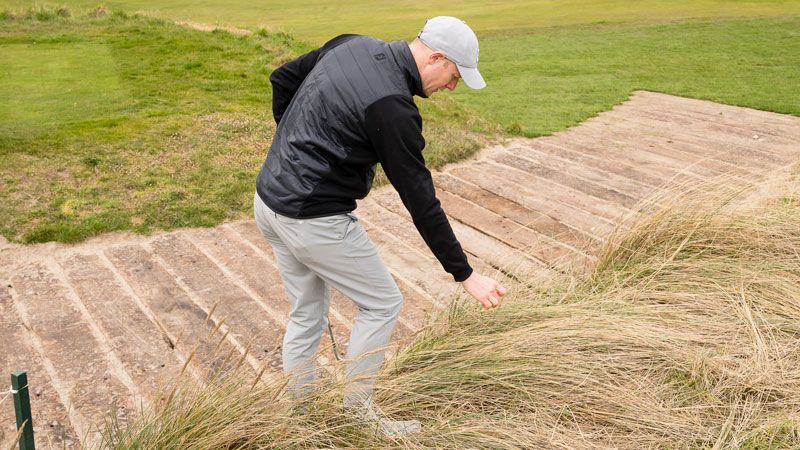

We explain the dropping and measuring procedures to use out on the golf course when taking relief
Golf Rules Explained: Dropping And Measuring
When the new Rules of Golf came into play on Jan 1, 2019 and there were two big changes regarding the dropping and measuring procedures.
From 2019, we now drop the ball from knee height rather than shoulder height, while club-length measurements must be made with the longest club you are carrying for that round other than the putter.
Below, we go into more detail on these two newer Rules, but before that, you might want to take a look at our video of what we think are the 7 most important golf rules...
Dropping procedure
Previously
Get the Golf Monthly Newsletter
Subscribe to the Golf Monthly newsletter to stay up to date with all the latest tour news, equipment news, reviews, head-to-heads and buyer’s guides from our team of experienced experts.
When taking free or penalty relief, the ball had to be dropped from shoulder height and then first strike a part of the course within the one- or two-club-length relief area.
It could then roll up to another two club-lengths not nearer the hole from where it first struck a part of the course.
From 2019
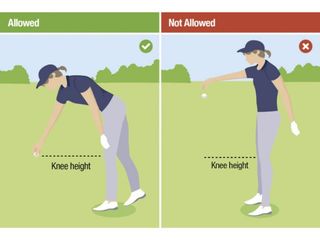
Drops are now from knee height and the ball must come to rest within the relief area, without the additional two club-lengths.
If it doesn’t, you will need to drop once more before being allowed to place it. The idea is that this new procedure should prove easier to understand and also quicker, as the ball is more likely to remain within the relief area.
It also means you can no longer end up almost four club-lengths away from where the ball was lying, which potentially created a big advantage sometimes.
More New 'Golf Rules Explained' features...
- New Golf Rules Explained: Penalty Areas
- New Golf Rules Explained: Bunker Changes
- New Golf Rules Explained: Putting Green
Fixed distances to be use for measuring
Previously
Club-length measurements were not fixed and players could use any club to measure, allowing those with long putters to potentially gain an advantage.
From 2019
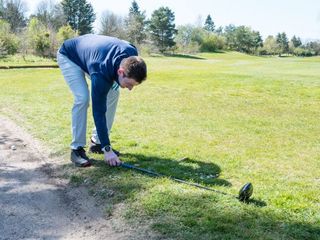
This potential measuring advantage had been a point of contention since long putters first appeared on the scene. So, club-lengths must now be measured using the longest club that you are carrying for that round with the exception of the putter.
Although there will obviously still be some differences in the length of players' longest clubs (shorter clubs for ladies and juniors, for example), this will now significantly minimise the extent to which any player could gain an advantage over another when measuring.
Related: 8 Rules Golfers Break Without Realising
For all the latest golf news and more rules content, check out the Golf Monthly website.

Location: Old Fold Manor
James has been coaching golf for 10 years and specialising in putting for more than six. In the past three years James has worked with more than 3000 golfers, including more than 200 professionals. If he was to single out a success it would be seeing Jamie Rutherford win the EuroPro Tour order of merit this year after working together for the past three years. His philosophy is simple – 'We do whatever it takes to make each individual better on the greens.’
A typical lesson:
It almost doesn’t exist, due to each session being catered to the individual. However, the general structure of a new client may be similar. I would start with an analysis of their current putting game. This would involve using video analysis, Capto and Quintic data, hitting putts from varying distances and break directions, asking appropriate questions the whole time. My goal in the opening 15-20 minutes of a session, is to understand the areas within which the client can find the biggest and fastest gains. I’m not just looking at their technique, I’m looking at their process and routines, asking them about their approach, and more.
Analysis of performance:
Keeping putting stats is extremely important to be able to notice tendencies and trends. My favourite stats app being Spider Putt. This allows me to notice these trends for specific putts, by both distance and slope amount. I have also composed a document of performance games for students to do during sessions or in their own time. This allows for in depth assessment over time in specific areas.
Most common problem:
Probably speed control. This usually starts with a lack of understanding of what they should be trying to achieve. More often than not, if they can fully understand what their goal is with acceleration in the stroke, they have a far greater chance of achieving it. I also have a bunch of great drills to help them improve their technique and enhance their skills.
-
 Max Homa Splits With Caddie Joe Greiner
Max Homa Splits With Caddie Joe GreinerHoma and his long-time caddie Joe Greiner have parted ways after six PGA Tour victories together
By Elliott Heath Published
-
 Sandy Lyle Shared 3 Top Tips With Us Prior To Winning The Masters in 1988... And They Could Still Save You Shots 37 Years Later
Sandy Lyle Shared 3 Top Tips With Us Prior To Winning The Masters in 1988... And They Could Still Save You Shots 37 Years LaterThe 1988 Masters Champion shared his expert tips in the January 1988 issue of Golf Monthly, but they are still absolute gems for amateur golfers to this day...
By Barry Plummer Published
-
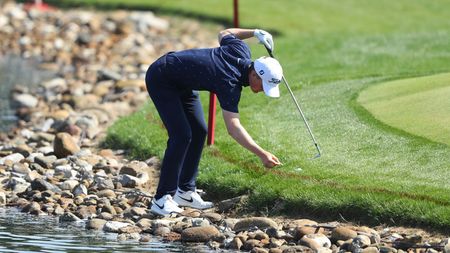 New Golf Rules Explained: Penalty Areas
New Golf Rules Explained: Penalty AreasThe new Rules of Golf came into force in 2019 and the term 'hazard' is no longer of use.
By Sam Tremlett Published
-
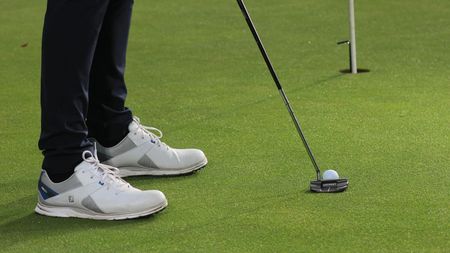 Golf Rules Explained: Putting Green
Golf Rules Explained: Putting GreenSeveral things changed on the shortest grass from 2019. Here's a summary...
By Tom Reid Published
-
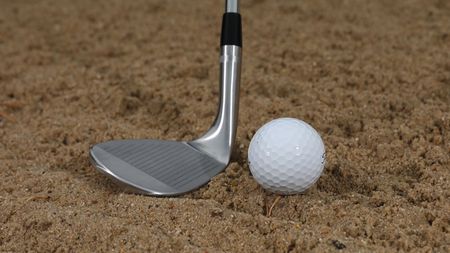 New Golf Rules Explained: Bunker Changes
New Golf Rules Explained: Bunker ChangesFrom 2019 the rules regarding loose impediments and unplayable lies in bunkers changed. Here is how.
By Elliott Heath Published
-
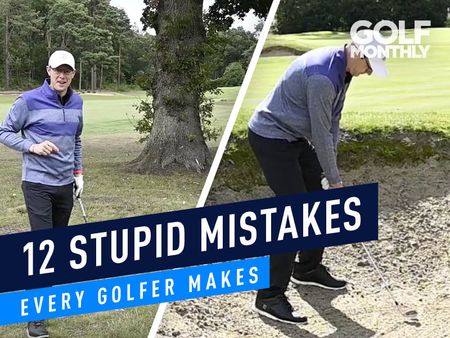 12 Stupid Mistakes Every Golfer Makes
12 Stupid Mistakes Every Golfer MakesWe count down the 12 stupidest mistakes every golfer makes, so that you don't make them again.
By Sam Tremlett Published
-
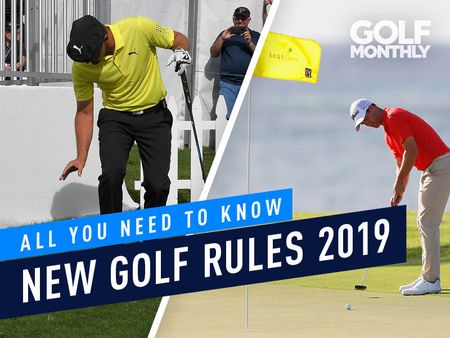 New Golf Rules 2019: All You Need To Know
New Golf Rules 2019: All You Need To KnowGolf's governing bodies new rules are in action in 2019.
By Elliott Heath Published
-
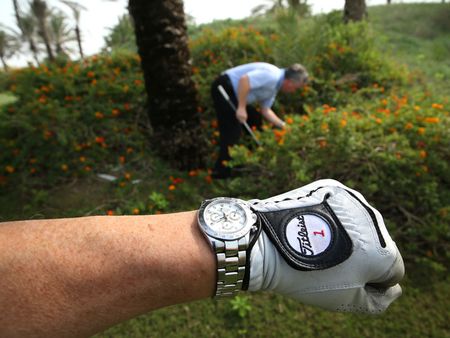 New Golf Rules Explained: Searching For Your Ball
New Golf Rules Explained: Searching For Your BallBall search time has been reduced to three minutes plus there are a couple of other changes in this category
By Golf Monthly Published